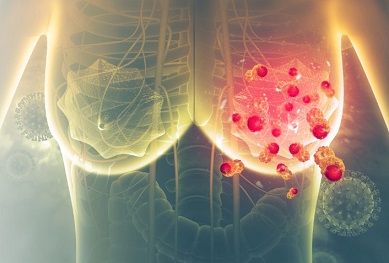Study Links Human Papilloma Virus, Epstein-Barr Virus And Cytomegalovirus With Breast Cancer
Nikhil Prasad Fact checked by:Thailand Medical News Team Apr 25, 2024 1 year, 9 months, 3 weeks, 6 days, 12 hours, 55 minutes ago
Cancer News: Breast cancer (BC) stands as a formidable global health challenge, being the most commonly diagnosed cancer among women and a leading cause of cancer-related deaths worldwide, particularly in low- and middle-income countries. In 2020 alone, nearly 2.3 million new cases were reported globally, with an estimated 685,000 deaths attributed to BC. Within this landscape of cancer burden, the Arab world, including Jordan, has witnessed a steady rise in BC incidence and mortality rates, highlighting the urgent need for a deeper understanding of BC's etiology, risk factors, and molecular pathways.
 Study Links Human Papilloma Virus, Epstein-Barr Virus And
Study Links Human Papilloma Virus, Epstein-Barr Virus And
Cytomegalovirus With Breast Cancer
The Global Context of Breast Cancer
The World Health Organization (WHO) identifies BC as the most prevalent cancer globally and a significant contributor to female cancer mortality. This disease's impact is particularly pronounced in the Arab world, where Jordan ranks among the top ten countries with high BC incidence and mortality rates. Reports indicate that BC accounts for nearly 38.4% of all diagnosed female malignancies in Jordan, emphasizing the critical nature of research aimed at unraveling the complexities of BC development and progression.
Viral Infections as Potential Risk Factors
While BC's etiology encompasses a myriad of genetic, environmental, and lifestyle factors, viral infections have emerged as intriguing candidates for understanding cancer pathogenesis. In particular, oncogenic viruses such as human papillomavirus (HPV), cytomegalovirus (CMV), and Epstein-Barr virus (EBV) have garnered attention for their potential roles in promoting cancer development through various molecular mechanisms.
Studies have suggested that these viruses can establish latent infections within breast epithelial cells, leading to dysregulation of cellular processes and contributing to malignant transformation. For instance, HPV has been implicated in disrupting apoptotic pathways, integrating its DNA into oncogenic regions, and inducing cellular proliferation. Similarly, CMV and EBV have been associated with immune evasion, cell cycle dysregulation, and oncogene activation, all of which can fuel tumor initiation and progression.
Study Design and Methodology
The collaborative study conducted by The Hashemite University-Jordan, Jordan University of Science and Technology, and King Saud University, Riyadh-Saudi Arabia, that is covered in this
Cancer News report, aimed to investigate the presence of HPV, CMV, and EBV in BC samples obtained from 110 Jordanian female patients. Additionally, breast tissue samples from 30 control subjects with no evidence of malignancy were included for comparative analysis.
Real-time PCR was employed as the primary method for detecting viral DNA/RNA in the collected samples, allowing for precise identification and quantification of HPV, CMV, and EBV. The study also encompassed an extensive analysis of clinicopathological characteris
tics among BC patients, including age, tumor stage, molecular subtypes, lymphovascular invasion, and lymph node involvement.
Key Findings and Interpretation
The results revealed that 24.5% of BC samples tested positive for HPV, with HPV16 being the most prevalent subtype. CMV and EBV were detected in 13.6% and 16.4% of BC cases, respectively. Interestingly, co-infections involving these viruses were observed in a subset of BC patients, albeit at lower frequencies. Statistical analyses further unveiled significant associations between HPV status and age, as well as between CMV infection and clinical stage.
The prevalence of these oncogenic viruses in BC samples from Jordanian women echoes global trends, albeit with regional variations in viral subtypes and co-infection rates. These findings shed light on the potential roles of HPV, CMV, and EBV in BC pathogenesis within the Jordanian context, prompting further exploration into the mechanistic underpinnings of viral contributions to cancer development.
Implications for Public Health and Future Research
Understanding the viral links to BC holds profound implications for public health strategies, including preventive measures such as HPV vaccination and targeted therapies that address viral-associated pathways in BC. The study's insights underscore the need for ongoing research endeavors, particularly in larger cohorts across Jordan and the wider Middle East and North Africa (MENA) region, to validate and expand upon these findings.
Future research directions may encompass exploring additional viral factors, evaluating the impact of viral infections on BC molecular subtypes, elucidating host-virus interactions, and developing tailored interventions that leverage viral targeting for improved BC outcomes. Collaborative efforts between research institutions, healthcare providers, and policymakers are essential in advancing our understanding of viral-associated BC and translating findings into tangible clinical benefits.
Conclusion
In conclusion, the collaborative study represents a significant step forward in unraveling the intricate interplay between oncogenic viruses and BC among Jordanian women. By identifying the presence of HPV, CMV, and EBV in BC samples and elucidating their associations with clinicopathological variables, the study lays a foundation for targeted interventions and personalized approaches to BC management. Continued research endeavors and interdisciplinary collaborations are imperative in harnessing the potential of viral factors as both diagnostic markers and therapeutic targets in the fight against breast cancer.
The study findings were published in the peer reviewed journal: Medicina.
https://www.mdpi.com/1648-9144/60/5/699
For the latest
COVID-19 News, keep on logging to Thailand Medical News.
